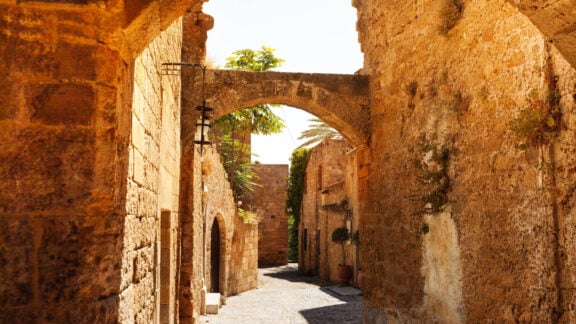The European Union, whose executive on Wednesday recommended opening formal membership talks with Ukraine and Moldova, has gone through several waves of expansion in the past 50 years.
The European Commission also recommended granting candidate status to Georgia, potentially putting it on the long road to membership.
The verdicts, in the European Commission’s annual reports on candidate countries’ progress towards EU norms, will go to the bloc’s 27 leaders at a summit in December to decide to start talks or not.
These could take years or decades.
On the eve of the proposal Ukrainian President Volodymyr Zelensky vowed that his country, invaded by Russia in February 2022, would “be in the European Union”.
When figures in the EU talk about the new members that might join the union by 2030, there is no mention of Turkey. It is a glaring omission noticed by Ankara.
Turkey, a formal candidate for membership since 1999, will barely be discussed – but it wasn’t always the case.
After EU leaders approved the start of accession talks with Turkey in 2004, the then British prime minister Tony Blair hailed it as a historic event that showed there was no clash of civilisations.
But European leaders at the time found themselves stuck in a tussle with Ankara over the divided island of Cyprus, a crisis that proved to be only a foretaste of the turbulent relationship.
Today, ties are more transactional than a path towards partnership, even if neither side will openly admit this. Experts nevertheless still point to limited areas in which the relationship can improve.
For many EU member states, the long-stalled accession talks are dead in all but name. In September, Austria – long opposed to Turkey’s membership – even called for the process to end.
EU officials privately say this would be more honest, but no one wants to make the first move.
After Turkey’s elections in May, EU leaders revived hopes for improvement. They ordered the EU’s executive arm and its foreign policy chief to prepare a report on how to develop the relationship.
The report is due before December’s next summit gathering of EU leaders, but experts and EU officials warn against expecting any real improvement in ties.
“I’m not expecting any meaningful revitalisation of the relationship because there are limited areas where progress can really be made,” said Senem Aydin-Duzgit, an international relations professor at Istanbul’s Sabanci University.
Turkey fatigue
There is “Turkish fatigue” in Europe, as Austria’s comments show, said the European Parliament’s Turkey rapporteur, Nacho Sanchez Amor.
“We are tired of maintaining the accession process alive when apparently there is no real political will from the other side to advance on democratic standards,” the MEP said.
The EU accuses Turkey of backsliding on democracy and the rule of law, particularly after the failed 2016 coup and the subsequent crackdown on its perceived supporters and government opponents.
The relationship’s transactional nature deepened after the two sides agreed a deal in 2016 under which the EU threw billions of euros at Ankara to stop migrants coming to Europe after the 2015 refugee crisis.
“Transactional is not a derogatory term,” Amor said. “Don’t mix the accession process, which has its own rules based on values and principles, with the rest of the relationship.”
The report due later this year will likely recommend updating the customs union, for which Turkey’s trade minister was in Brussels in October to drum up support.
“If the customs union talks could start with this current government, I don’t think they would lead anywhere,” Aydin-Duzgit said, since Ankara would have to make unappealing reforms.
But if Brussels is sending mixed messages about the relationship’s future, so is Turkish President Recep Tayyip Erdogan.
He warned in September that Turkey could “part ways with the EU if necessary”, just two months after he said that if Sweden wanted Ankara’s green light to join NATO, the EU should “pave the way to Turkey’s membership”.
Turkey’s ambassador to the EU reaffirmed Turkey’s commitment to accession, but acknowledged it was not going to be easy.
“The Turkish government is committed to EU membership,” said Faruk Kaymakci. “What we expect is equal treatment among candidate countries.”
Many observers, and Turks, seek clarity, while others argue the nail was firmly in the coffin when then French president Nicolas Sarkozy and former German chancellor Angela Merkel together came out against Turkey’s membership in 2009.
There is, however, pressure from the United States not to end accession negotiations, an EU official said, with Washington desperate to keep Turkey out of Russia’s arms and closer to the West amid Moscow’s attack on Ukraine.
Brussels now faces a bigger dilemma about Ukraine’s future membership, and the challenges and opportunities its accession would bring.
One that some say blows any chance of Turkey’s membership.
“Ukraine’s membership would change the EU and it could not take on another member like Turkey,” the official told AFP.
Growing waiting list
Ukraine, whose European ambitions have fuelled two revolutions since 2004, and Moldova brought to eight the number of countries in the EU’s waiting room.
The two former Soviet republics were among six countries with which the EU formed an Eastern Partnership in 2009, trading closer economic and political ties for reforms.
The others were Armenia, Azerbaijan, Georgia and Russia’s ally Belarus, which later opted out.
Georgia on Wednesday also gained the recommendation for EU candidate status it has been pressing for.
Gaining full membership is a complex process which usually takes several years, as aspirants have to take on board the vast body of EU law.
While Finland was admitted in fewer than four years, it took the three ex-Soviet Baltic states of Estonia, Latvia and Lithuania nine.
Several enlargements, one departure
Founded in 1957, the European Economic Community (later renamed the EU) started out with six members – Belgium, France, Italy, Luxembourg, the Netherlands and West Germany.
In 1973, Britain, Denmark and Ireland joined, followed by Greece, Portugal and Spain in the 1980s.
In 1995, the bloc began expanding eastwards, admitting Austria, Finland and Sweden in a leap that gave it a shared border with Russia for the first time.
In 2004 came the “big bang” enlargement from 15 to 25 members, with eight ex-Communist Eastern European countries along with Cyprus and Malta raising EU flags in one swoop.
In 2007, Bulgaria and Romania took the EU to 27 members and in 2013 Croatia became the 28th.
Britain became in 2020 the first member state to leave the EU, after a seismic 2016 referendum vote Turkey’s biggest EU defender quit the bloc, taking its members back down to 27.
Source: AFP








